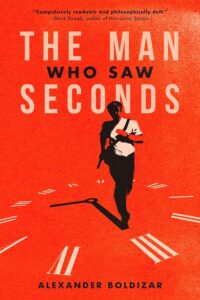“The author should die once he has finished writing,” wrote Umberto Eco. “So as not to trouble the path of the text.” I’m a fan of this open approach to art and write in a way that seeks to expand rather than narrow what a book can mean to the reader. Once it’s finished, it’s your book not mine.
That said, certain ignition energies inevitably come from the author’s own life. In The Man Who Saw Seconds, my new thriller about a man who can see five seconds into the future, both the emotional energy and some of the thematic questions are shaped by my own past. Not the answers, I hope. Just the questions.
The emotional fuel behind Preble Jefferson’s relentless fight to save his family was my son’s week-long abduction when he was very young. It all turned out well, and that’s one of the best things about being a writer. Ten years later you can be grateful for events that melt your teeth with stress when they’re happening, because they give you a story and a fire. Give me ten more and I’ll write a novel where the monster is cancer. My beautiful wife, Tania Xenis, died of colon cancer while I was finalizing this one.
A number of reviewers picked up on this core drive for a man to protect, or try to protect, his family. Andrew Case, author of The Big Fear, wrote, “And for all its adventure, at its heart [The Man Who Saw Seconds] is a story of a father’s love for his wife and child, for whom he will do anything.” And Martin Ott, author of Dream State, said, “No novel in recent memory answers the question as convincingly: ‘Will I risk destroying the world to save the people I love?’”
We all understand the urge to protect those we love. When it comes to ideas, however—especially ideas that approach politics—writing is trickier. When I read a novel, I don’t want to be told what to think, not even if I agree. But individual characters can have complex political backstories.
In Seconds, the most fun is probably Preble’s best friend, Fish. A Hungarian defector during the Cold War turned anarchist law professor, Fish’s full name is the unpronounceable Robert Legmegbetegedettebbeknek (yes, that’s a real word, meaning “the sickest.”) While Fish isn’t me, he does grow out of a slice of my past. If Preble is my emotional self during my son’s abduction, Fish is my intellectual youth.
I was seven when we defected from communist Czechoslovakia—an old-school, sneak-across-the-Iron-Curtain type of defection, complete with my parents throwing me and my one-year-old brother from one heaving boat to another off the coast of Yugoslavia when our boat’s engine died during a storm in the Adriatic Sea. I had my eighth birthday in the Traiskirchen refugee camp in Austria, where we spent six months hoping for a country. Canada took us in and gave us a home, something I remained permanently grateful for even as I moved and lived all over the world, including various cities in the U.S.
My dad had been in the Czechoslovak special forces, and he was determined to put an ocean between us and Russia, certain Russia would never stop invading neighbors—decades later he revealed to me that he still remembered every street in Brussels and Amsterdam, as every man in his unit had had to memorize two West European cities. Those two were his.
People today forget how oppressive, gray and all-consuming Soviet Block communism was. The expression in Slovak for the system was “the totality.” People referred to living “under the totality,” which conveys what life was like more accurately than the abstract adjective “totalitarian.” It was a system that wanted total control over everything, every detail of life down to the most personal—an impulse that seems to repeat wherever there is a concentration of power, in direction if not in degree.
That may be why the main antagonist in Seconds, Thaddeus Bigman, works for the NSA’s Total Information Bureau and why Fish, like a lot of East European émigrés, has a fear of the security organs that’s so bone deep it’s almost genetic.
Fish isn’t a libertarian. He’s skeptical of all institutions, corporations and collective entities above a certain size. I read a lot of anarchist philosophy in my twenties as a reaction to the “stories from the totality” that I’d grown up with. It’s probably why I went to law school: know thy enemy. But Fish is an old man, not a twenty-year-old, and his anarchism has been distilled to a narrower, more-mature insight—a core belief in the concept of counterproductivity as described by the philosopher Ivan Illich.
Illich’s formulation was dry: “Once it reaches a certain threshold, the process of institutionalization becomes counterproductive.”
In Seconds, Fish rephrases that as “Every institution ends up working against the purpose for which it was created.” While ministries of defense that start wars are an obvious example, Illich applies this to a wide range of modern life, from schools that make people stupid to hospitals that make them sick to “motorized vehicles that create the remoteness which they alone can shrink.”
It works for any new technology that first brings social benefits but ends by forcing society to adapt to the technology. It certainly applied to the utopia of Soviet communism. And it can even apply to a man whose single-minded fight against monsters inevitably turns him into one.
There’s an inherent absurdity to this sort of counterproductivity, which may be why a sense of the absurd is threaded through so much of Eastern European literature. It’s not South American style magical realism. People don’t start levitating. Instead, it’s just a touch, a light balancing act between real and surreal, between conviction and satire. The decision-cycles in The Man Who Saw Seconds become absurd only gradually, and different readers disagree on when that threshold is crossed. But the spiral also reflects how these soulless, all-consuming system-machines really do work—humanity that’s been institutionalized, mechanized, almost mineralized, to paraphrase Ortega y Gasset.
The book is first and foremost a fast-paced thriller, not dependent on this subtext. I wanted to ensure a reader could enjoy it as a Jason Bourne-style Hollywood movie without any of these thematic or satirical elements. But they’re there for those who want to read them, within character motivations and the general madness of the constant escalation—which becomes counterproductive for everyone.
Fish’s anarchic distrust of institutions is rooted in my own distrust of the sort of control that suffocated the human spirit under the totality. But I do understand the other side. I appreciate how dangerous the mass loss of trust in institutions is to our democracies—even if some of that loss is justified. I’m a recovering attorney, but still a member of the California bar. I spent time as a speechwriter for the Civilian Complaint Review Board, which investigated bad members of the NYPD. I’m an instructor in Brazilian jiu-jitsu, and over the decades my sparring partners have included dozens of cops, SWAT team operators, and even friends who formerly served as bodyguards for prime ministers in Canada and Israel.
I write first for the love of a good story, and all these past lives help add texture to how well I can tell it. But second, I write to clash ideas against each other. (How cool that my publisher is CLASH Books!) With Seconds, I feel like I finally learned how to integrate those two drives seamlessly, something I was less successful with in my previous novel, The Ugly. It’s this clash that causes the story to keep escalating and it’s why I insist on making my antagonists as formidable as possible—steelmen rather than strawmen. I never want my hero to win because someone makes a mistake, like a James Bond villain who talks too long, and I never want to offer easy answers. Preble’s slim superpower is just barely enough to give him a fighting chance, maybe.
Mark Powell, author of The Late Rebellion, described Seconds as, “part thriller, part gunfight (hell of a gunfight), part intellectual examination of what we mean when we say ‘freedom’ and all heart. Absurd, hilarious, and deadly serious, this is the rare novel that is both compulsively readable and philosophically deft.”
I don’t have an answer for what we mean when we say “freedom,” but I do know that my own conception of it was deeply shaped by being born in a country with none. For me, freedom is tied to openness—and that includes the interpretations of anything I’ve written.
I like to think of the emotional and intellectual themes in my writing as the two wings of a story. They provide the lift, but they shouldn’t be tied down to my own past. If my personal background adds possibilities to how you read the book, then that makes me happy. If not, kill me and enjoy The Man Who Saw Seconds.
***


















